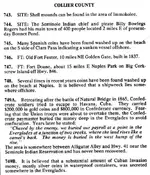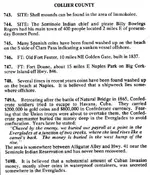SWR wrote
Are you claiming the KGC and the Confederate Secret Service are one in the same, or somehow connected?
If so, could you post your source?
Now where did I say that? You have a regular habit of putting words into other folks posts, which appears to be a rather weak attempt to derail the discussion. I am not saying that the KGC is the Confederate Secret Service, nor that they worked together (though some communications may have occurred) rather that at least SOME modern stories of KGC treasures are in fact stories based on Confederate Secret Service actions. The KGC was short on funds (according to several sources) so not a likely source of many thousands of tons of gold and silver being buried around the country. Modern writers have made many mistakes when writing treasure stories. The page posted here from Thomas Terry's encyclopedic work on treasures shows where this story may have been born, and how error has crept in. I will explain.
<Terry wrote>
749 a
Retreating after the battle of Natural Bridge in 1865, Confederate soldiers tried to escape to Havana Cuba.
The author of one version we have been debating may well have read this and ASSUMED that the Confederates were retreating after LOSING the battle of Natural Bridge (they won actually) so wrote that the CS was retreating after losing the fight. The date problem is not uncommon either - for a
2 can be mistaken for a
5, especially by a person who is slightly dislexic, or trying to read fine print late at night. Treasure stories get distorted, but still are based on facts. The trick is in finding the root truth. Our mutual friend Cactusjumper has a saying, "History gets changed one word at a time" and this is all too true when we are dealing with treasure stories.
This story we are dealing with could still be a complete fantasy tale, but I believe we have enough documentation to show that several CSA officials were trying to escape the country with considerable sums of money late in the war, and that surreptitious attempts to ship money out of the country to foreign countries was being done on a regular basis - to buy the arms, clothing, shoes, powder, etc so badly needed by the Confederacy. Just on a few messages we can find in the OR it appears that there were problems with large sums of cash being transferred around the country in 1862.
Sabre15 wrote
I have been curious for a long time now on Thomas Terry, I have volume 3 and wonder where did his info come from? Was he known to embellish some stories to add to the appeal of his treasure book?
I cannot speak for Thomas Terry and do wish that he had included his sources, but can say this - that
Terry was much more of a compiler than a fact-checker. He simply compiled all the treasure stories he could find without trying to determine whether they had a basis in fact or not. So I have found a few stories that had garbled info, but I also have had good success in finding documentation for other stories he has listed. One local example from the Black Hills, Terry has a brief entry on a prospector named Bailey who found rich float while coming down a mountain that had very rich silver values - according to Terry, Bailey returned to stake a claim and could not locate the spot. I found the correct Bailey, when he arrived in Deadwood by stage, the actual assay record of over $15,000 per ton silver, a newspaper account of his find, as well as the man's homestead, marriage, death etc. Bailey searched for the spot repeatedly, without success. To sum it up, I don't think Terry deliberately included any falsehoods, he didn't have time to research every story just to "prove them up" so we may find some stories that are indeed false.
SWR wrote
Read:
“This relief can the more readily be obtained from the assistant treasurer at Jackson, Miss., who has in his charge several millions of dollars belonging to the banks of New Orleans, La., seized by my orders when I was informed those funds were to be returned to those banks in obedience to the instructions of Major-General Butler, Federal commander at that point.”
Not:
In his possession
The mony never left New Orleans
How do you reach that conclusion, when
Beauregard specifically states that the monies are held by the assistant treasurer at Jackson, Mississippi, which was at that time still in Confederate hands?

Can you explain?
Good luck and good hunting amigos, I hope you find the treasures that you seek.

Oroblanco




 the money then could easily be sent by train to baldwin and then westward towards tallahassee or northward (georgia or virgina ,ect) or southward toward the beef buying area - fort brooke * near tampa .
the money then could easily be sent by train to baldwin and then westward towards tallahassee or northward (georgia or virgina ,ect) or southward toward the beef buying area - fort brooke * near tampa .


 Can you explain?
Can you explain?  there would be no money for him to give -- so its clear that the money had to be under his "charge" ---"control" or safe keeping ---in jackson, mississippi * in 1862
there would be no money for him to give -- so its clear that the money had to be under his "charge" ---"control" or safe keeping ---in jackson, mississippi * in 1862
